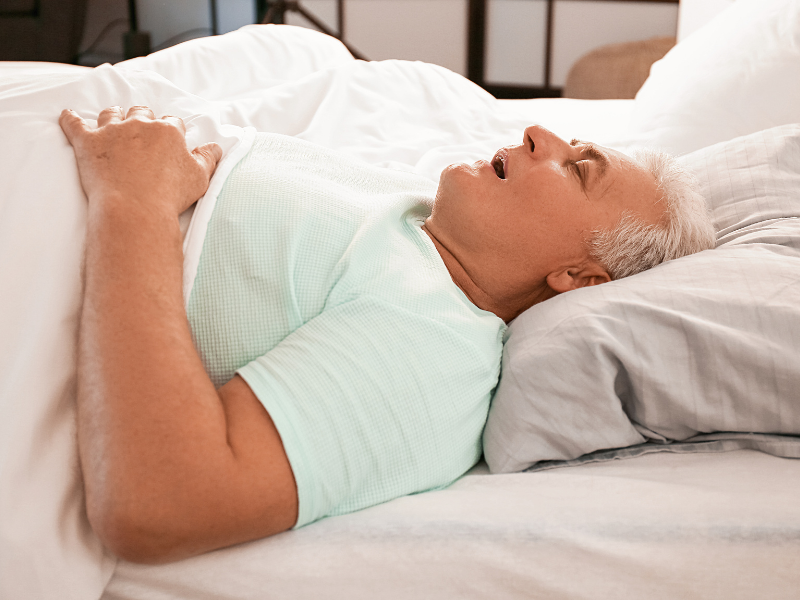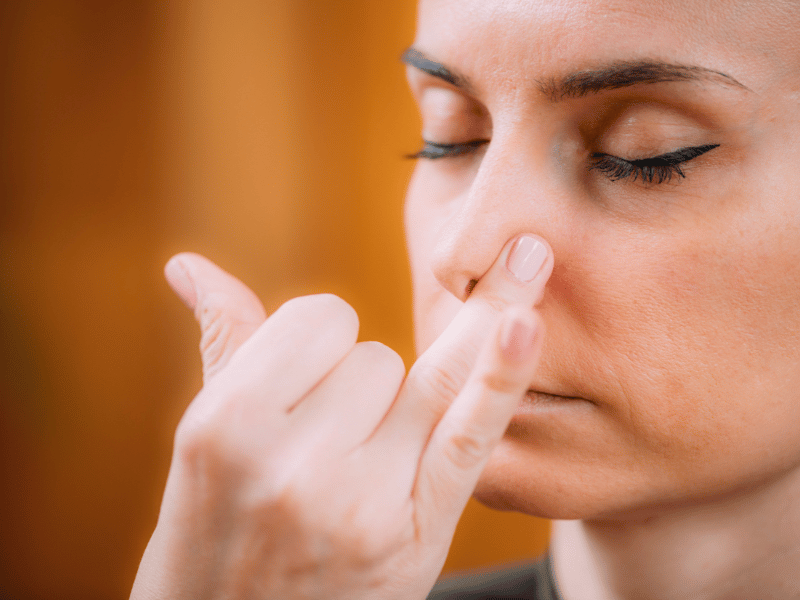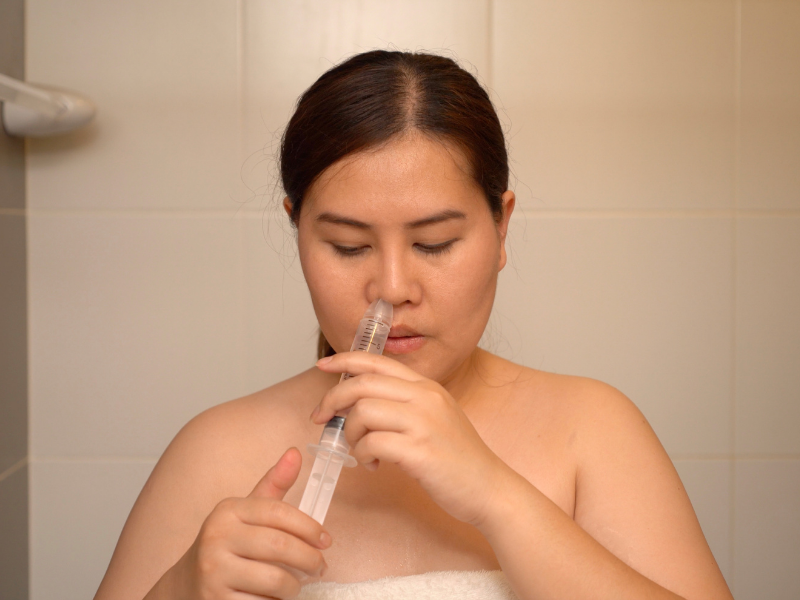


Breathing is an essential life process that allows us to get the oxygen that we need and expel carbon dioxide for survival. However, the way we breathe—especially during sleep—can significantly impact our health. While breathing through your nose is the body’s natural way of inhaling oxygen, it’s common for many, especially children to breathe through their mouths.
This habit can lead to various problems such as dry mouth, disrupted sleep, and more. The question is, how can you stop mouth breathing while sleeping? Keep reading to discover 5 effective strategies.

Mouth breathing is the act of breathing through the mouth instead of the nose. This can occur during both daytime and nighttime. While occasional mouth breathing is normal, chronic or habitual mouth breathing, especially during sleep, may be indicative of underlying issues such as nasal congestion, allergies, deviated septum, or other sleep disorders like sleep apnea [1].
It impacts both children and adults, with an estimated 10% to 25% of children affected by mouth breathing [2].
Chronic mouth breathing can have various implications, including potential impacts on sleep quality, snoring, dry mouth, and increased risks of sleep disorders.

The main reason behind mouth breathing is usually nasal obstruction. This can be a result of allergies, a flu, or cold. Mouth breathing can also be attributed to a deviated septum, enlarged tonsils or enlarged adenoids which is an indication of a collapsed soft tissue in the throat [3].
People who regularly breathe through their mouths and not their noses, especially during sleep, may face several complications. Some problems include [4], [5]:
Based on multiple studies, mouth breathing can influence the growth of your facial structure, especially for children. In 2022, a study was carried out to find out if there was a change in facial morphology in patients who breathed through their nose and mouth. The findings showed that those who mouth breathed had a more protruded upper lip and a larger facial height compared to those who breathed through the nose. However, there was no significant correlation found between facial morphology and breathing patterns but rather a result of correlative trends [8].
Separately, an older study that was conducted in 2014, found that those who had the mouth breathing habit had exhibited a noticeable increase in the forward tilt of the lower front teeth, difficulty in closing the lips, and a protruding facial profile [9]. Thus, showing that mouth breathing can potentially affect facial growth and contribute to facial deformities.
To get yourself to stop sleeping with your mouth open, consider implementing these few practical strategies.

Incorporating nasal breathing exercises during the day can help to improve respiratory function and train your body to breathe through your nose rather than your mouth. Additionally, it helps to strengthen and improve the muscle tone in your mouth and throat.
Some nasal breathing exercises to try include alternate nostril breathing, diaphragmatic breathing, and pursed-lip breathing.

If you are mouth breathing because of nasal congestion, it is recommended to try flushing the nose with saline water in a squeeze bottle or a saline spray. Doing so can help to clear out mucus and allergens so that it’s easier for you to breathe through your nose normally.
If you want to stop mouth breathing while sleeping check your sleeping position first. For many sleeping in a supine position can obstruct the airways while sleeping in a lateral position opens up the airways. Lying down on your side helps most people to breathe smoothly and naturally but if the nose is blocked on one side, you may want to turn to the other side.
Alternatively, you may want to lay in a supine position but ensure that you keep your head elevated. Elevating the head not only helps prevent mouth breathing but also deals with other problems like acid reflux or other acids produced by the stomach from regurgitating into the throat. It also creates an unobstructed nasal passage for the air to flow freely and stop mouth breathing.
Your sleep position should allow proper nasal drainage so that the nose does not become obstructed, which can then hamper the unobstructed flow of air while breathing. Hence, checking and adjusting your sleeping posture is also one of the natural ways to eliminate the habit of mouth breathing.

Eating a balanced diet is the key to good overall health. This also applies to eliminating mouth breathing. Eating a balanced diet can protect you from allergies and sinus problems. It will prevent you from becoming overweight, which is yet another common cause of mouth breathing since the increased weight causes increased pressure on the nasal cavities and lungs.

Exercising daily is good for your overall health, while specific exercises of the facial muscles and throat can help in proper breathing. Aerobics can help in reducing weight while also improving your overall breathing and lung capacity. With regular aerobic exercises, you can learn to breathe in and out to meet the increasing oxygen demand. Yoga is also an ideal form of exercise for good breathing coordination and movement.

You should see a doctor if you or your child experience persistent mouth breathing, especially if it’s accompanied by symptoms such as dry mouth, snoring, difficulty breathing, and facial deformities.
If you suspect that your mouth breathing may be a sign of an underlying condition such as sleep apnea, you should consult a qualified doctor for further diagnosis and treatment recommendations.
Mouth breathing while asleep can lead to several health issues such as dry mouth and poor sleep quality to more serious conditions like snoring and sleep apnea. By adopting effective strategies like nasal breathing exercises, adjusting your sleep position, and maintaining a balanced diet and exercise routine, you can take control of your breathing habits and reduce the occurrence of mouth breathing.
Want to improve your breathing and sleep better at night? Track your sleep patterns with the ShutEye® app and discover personalized sleep tips to help you manage your mouth breathing and sleep soundly at night. Download for free today!
Ballikaya, E., Dogan, B. G., Onay, O., & Tekcicek, M. U. (2018). Oral health status of children with mouth breathing due to adenotonsillar hypertrophy. International Journal of Pediatric Otorhinolaryngology, 113, 11–15. https://doi.org/10.1016/j.ijporl.2018.07.018